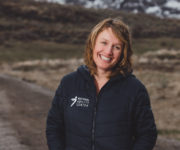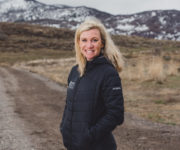Meet the Match
An Armenian Disability Sport Leader Envisions a Bright Future
Growing up in the snowiest region of Armenia, Gagik Sargsyan naturally loved skiing. As a boy, he tried wrestling and other sports with his friends, but they didn’t impact him like cross-country skiing in the open air of his village. When his father gave him his first ski suit and set of boots, Gagik would even sleep with them in his bed at night.
“For me, sport is like a school for educating you on how to live life,” Gagik says, “and I was in school when I was out on the mountains.”
At 16 years old, Gagik left Vardenik and moved to the capital city, Yerevan, where he began his studies in ski sport pedagogy at the Armenian Institute of Physical Culture and Sport (ASIPC). At university, he captained the cross-country ski team for three years. He stayed at the university through his Ph.D., and later added a master’s degree in law from the Public Administration Academy of the Republic of Armenia.
In 2005, Gagik accepted a position as general secretary of the Armenian Ski Federation. In this role, he is responsible for managing international affairs, coordinating the national team, organizing events, and developing the annual budget and development plan. As a promoter of sport from within the federation, he has launched three programs focused on children’s participation in snow sports. His passion for sport is so pervasive that he continues to train regularly with the alpine skiing national team.
In addition to Gagik’s work at the federation, he was recently appointed dean of the faculty of sport pedagogy and management at ASIPC. The university is the only institution in Armenia that offers training in sports therapy and physical rehabilitation, with significant potential to positively impact people with disabilities nationwide.
Although he does not have a disability, Gagik has become increasingly aware of the needs of Armenia’s disabled community. According to the United Nations, 185,000 people in the country have disabilities. During his time at the federation, Gagik has seen how the “outdated system of sport,” as he calls it, has kept people with disabilities from participating in large numbers. Many buildings and sports facilities are inaccessible to wheelchair users. And with funding concentrated in specialized government schools, as opposed to clubs, there are limited opportunities for non-recruited athletes to these schools to gain entry into established sports programs. Gagik is on a mission to break down these roadblocks.
“Sports is intended to level the playing field and show that everyone is equal,” Gagik says. “It is an important part of your physical education and rehabilitation. But, if you have a disability, you must be very determined to play. There isn’t a special government program to support disability sport; our budget at the federation is one-third the budget of the government’s cross-country school.”
One of the solutions, in Gagik’s opinion, is stronger collaboration between government, NGOs, the Paralympic committee, universities, and international sporting bodies. In terms of national impact, Gagik has a close working relationship with the president of the Paralympic committee, and has already been told by Ukraine’s Paralympic cross-country coach that he would collaborate to train Gagik’s athletes. The federation also recently hosted its first program successful targeting military veterans with disabilities. With Gagik’s influential positions at the federation and the university, he feels there are vast opportunities to work with more coaches, athletes, and trainers to improve the system of sport across Armenia.
“If we want a strong sports system in Armenia, we need to build it step-by-step, in a roundtable, to make sure we are together and can be successful,” Gagik says. “I have strong relationships and people ready to help with the training and competitions.”
Through the U.S. Department of State Global Sports Mentoring Program, Gagik learned more about the history and methodologies of the U.S. sports system at both the university and national level, as well as engaged in an idea exchange on how to strengthen the impact he can make for people with disabilities in his country. At the National Ability Center, an official U.S. Paralympic sports club with comprehensive adaptive sports programs focused on inclusion and therapeutic recreation, he worked with CEO Gail Loveland and Tracy Meier, program and education director, executive leaders in an organization that provides 30,000 annual sports experiences in Park City, Utah. In addition to its significant grassroots and community engagement, the NAC’s first-rate facilities are home to Paralympic development programs in a range of winter sports, including alpine skiing, adaptive snowboarding, and paratriathlon. During his mentorship, Gagik was able to access many of the tools he needed from a training and administration perspective in order to create a collaborative and structured plan to expand sports and education opportunities for people with disabilities across Armenia.


